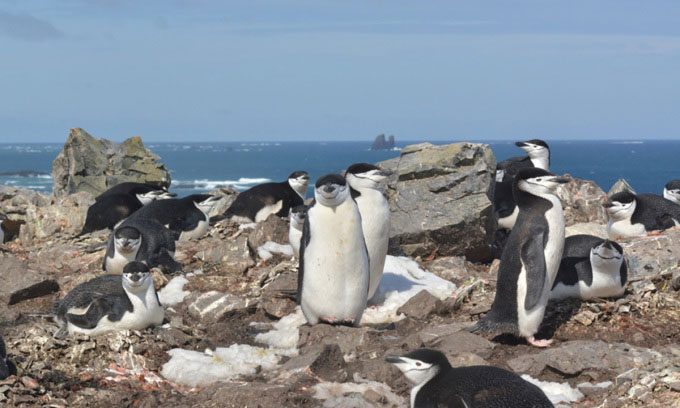Instead of sleeping for long periods, macaroni penguins divide their sleep into many short naps lasting just a few seconds to continuously watch over their eggs and chicks.
Macaroni penguins (Pygoscelis antarcticus) on King George Island, Antarctica, take over 10,000 short naps each day. These naps last only about 4 seconds, allowing the penguins to continuously monitor their nests and protect their eggs and chicks from predators. In total, they sleep approximately 11 hours each day. This new research was conducted by expert Paul-Antoine Libourel at the Lyon Neuroscience Research Center along with colleagues, and was published in the journal Science on November 30th.

Macaroni penguins on King George Island, Antarctica. (Photo: Paul-Antoine Libourel/Science)
On King George Island, brown skuas (Stercorarius antarcticus) are among the predators that hunt macaroni penguin eggs. Brown skuas often sneak in to take unprotected eggs, mainly from nests located on the outskirts.
The pairs of macaroni penguins often separate to forage for food; one will go to sea while the other stays to guard the nest. Consequently, the one at home must remain vigilant to protect the eggs or chicks, preventing them from being attacked by predators like skuas or other penguins.
In the new study, the team monitored 14 penguins with eggs in their nests. They used data loggers to measure sleep-related activities in the brain and body posture changes. The researchers found that nest-guarding penguins could sleep both while lying down and standing, with nearly 72% of their short-wave sleep (SWS) occurring in bursts of less than 10 seconds.
Parent penguins experience about 600 SWS bursts each hour. However, while incubating eggs in the nest, they go through more SWS, divided into shorter bursts. The depth of their sleep slightly increases around midday when the risk of predation is at its lowest.
Another interesting finding is that penguins nesting on the outer edges of the colony actually sleep better and have longer SWS periods than those nesting closer to the center, contrary to what the research team had previously thought. This suggests that the need for vigilance against predators like skuas may not be as high. Instead, attacks from other penguins may pose a more direct threat.


















































